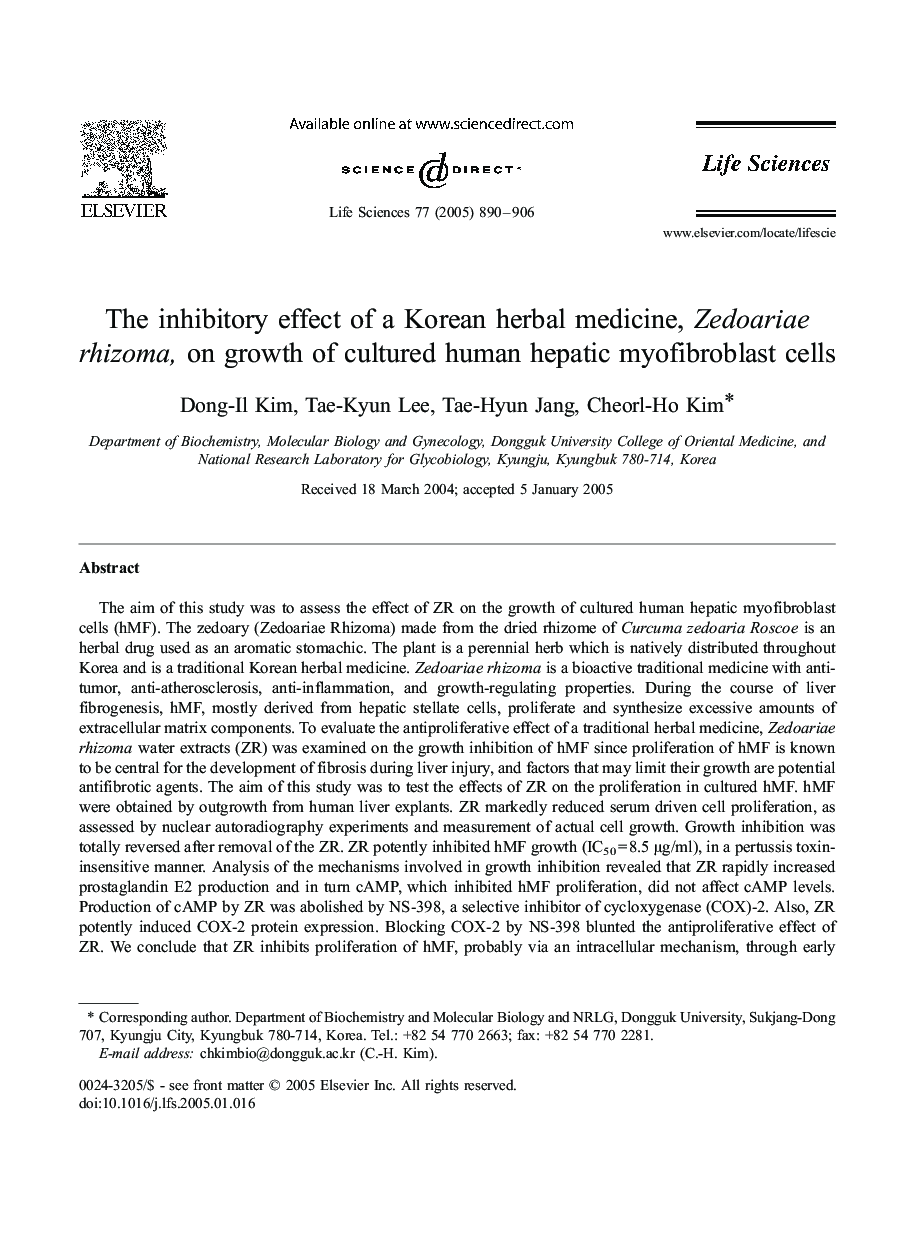| کد مقاله | کد نشریه | سال انتشار | مقاله انگلیسی | نسخه تمام متن |
|---|---|---|---|---|
| 9012734 | 1125007 | 2005 | 17 صفحه PDF | دانلود رایگان |
عنوان انگلیسی مقاله ISI
The inhibitory effect of a Korean herbal medicine, Zedoariae rhizoma, on growth of cultured human hepatic myofibroblast cells
دانلود مقاله + سفارش ترجمه
دانلود مقاله ISI انگلیسی
رایگان برای ایرانیان
کلمات کلیدی
موضوعات مرتبط
علوم پزشکی و سلامت
پزشکی و دندانپزشکی
کاردیولوژی و پزشکی قلب و عروق
پیش نمایش صفحه اول مقاله

چکیده انگلیسی
The aim of this study was to assess the effect of ZR on the growth of cultured human hepatic myofibroblast cells (hMF). The zedoary (Zedoariae Rhizoma) made from the dried rhizome of Curcuma zedoaria Roscoe is an herbal drug used as an aromatic stomachic. The plant is a perennial herb which is natively distributed throughout Korea and is a traditional Korean herbal medicine. Zedoariae rhizoma is a bioactive traditional medicine with anti-tumor, anti-atherosclerosis, anti-inflammation, and growth-regulating properties. During the course of liver fibrogenesis, hMF, mostly derived from hepatic stellate cells, proliferate and synthesize excessive amounts of extracellular matrix components. To evaluate the antiproliferative effect of a traditional herbal medicine, Zedoariae rhizoma water extracts (ZR) was examined on the growth inhibition of hMF since proliferation of hMF is known to be central for the development of fibrosis during liver injury, and factors that may limit their growth are potential antifibrotic agents. The aim of this study was to test the effects of ZR on the proliferation in cultured hMF. hMF were obtained by outgrowth from human liver explants. ZR markedly reduced serum driven cell proliferation, as assessed by nuclear autoradiography experiments and measurement of actual cell growth. Growth inhibition was totally reversed after removal of the ZR. ZR potently inhibited hMF growth (IC50 = 8.5 μg/ml), in a pertussis toxin-insensitive manner. Analysis of the mechanisms involved in growth inhibition revealed that ZR rapidly increased prostaglandin E2 production and in turn cAMP, which inhibited hMF proliferation, did not affect cAMP levels. Production of cAMP by ZR was abolished by NS-398, a selective inhibitor of cycloxygenase (COX)-2. Also, ZR potently induced COX-2 protein expression. Blocking COX-2 by NS-398 blunted the antiproliferative effect of ZR. We conclude that ZR inhibits proliferation of hMF, probably via an intracellular mechanism, through early COX-2-dependent release of prostaglandin E2 and cAMP, and delayed COX-2 induction. Our results indicated a novel role for ZR as a growth inhibitory mediator and pointed out its potential involvement in the negative regulation of liver fibrogenesis. The results that ZR exhibits potent antiproliferative and antifibrogenic effects toward hMF, indicated that ZR might have therapeutic implications in chronic liver disease.
ناشر
Database: Elsevier - ScienceDirect (ساینس دایرکت)
Journal: Life Sciences - Volume 77, Issue 8, 8 July 2005, Pages 890-906
Journal: Life Sciences - Volume 77, Issue 8, 8 July 2005, Pages 890-906
نویسندگان
Dong-Il Kim, Tae-Kyun Lee, Tae-Hyun Jang, Cheorl-Ho Kim,